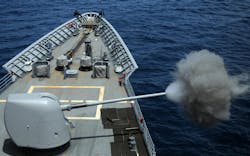Researchers ask industry to use artificial intelligence (AI) and machine learning to enhance naval gunfire
ARLINGTON, Va. – U.S. military researchers are asking industry to apply artificial intelligence (AI) and machine learning to help select targets for, and enhance accuracy of, the U.S. Navy's Mk 45 five-inch deck gun aboard Arleigh Burke-class destroyers.
Officials of the U.S. Defense Advanced Research Projects Agency (DARPA) in Arlington, Va., issued a program solicitation (DARPA-PS-25-02) last Friday for the Heimdall project to improve naval gunfire.
Heimdall seeks rapid delivery of new AI and machine learning software to the Mk 45 deck gun's Mk 160 gun computer system to aid or automate jobs that gun operators today do by hand.
The program will develop an operator aid with an activation and deactivation selection; there is no intent to switch the overall gun system to an autonomous weapon, DARPA researchers say.
The Heimdall Program consists of two six-month phases with several performers for the development phase, and a limited set of performers for the integration phase.
Development may include several performers conducting algorithm development to help operators identify targets from electro-optical or infrared sensor feeds and improve tracking of targets. The project will involve an in-lab simulation evaluation of the Mk 160 gun computer system, and a range test involving an at-sea test.
Companies interested should email abstracts no later than 30 Oct. 2024 to [email protected]. Email questions or concerns to [email protected]. More information is online at https://sam.gov/opp/4060eaf5be334a4b8d1c45a048c2172a/view.
About the Author
John Keller
Editor-in-Chief
John Keller is the Editor-in-Chief, Military & Aerospace Electronics Magazine--provides extensive coverage and analysis of enabling electronics and optoelectronic technologies in military, space and commercial aviation applications. John has been a member of the Military & Aerospace Electronics staff since 1989 and chief editor since 1995.
